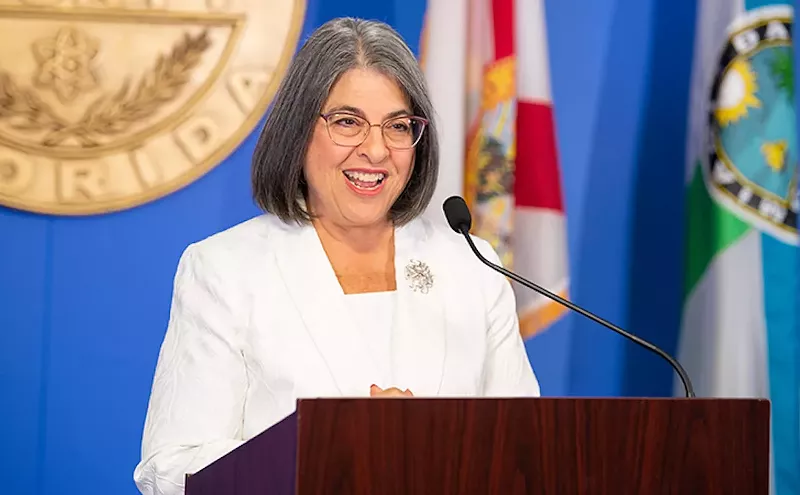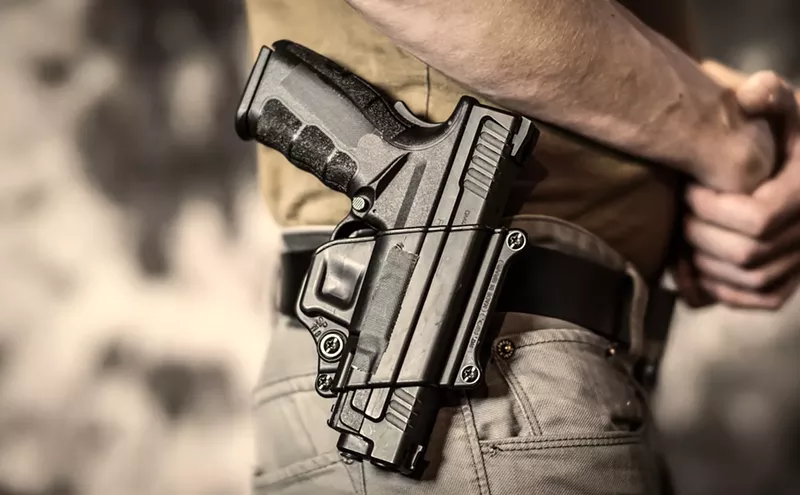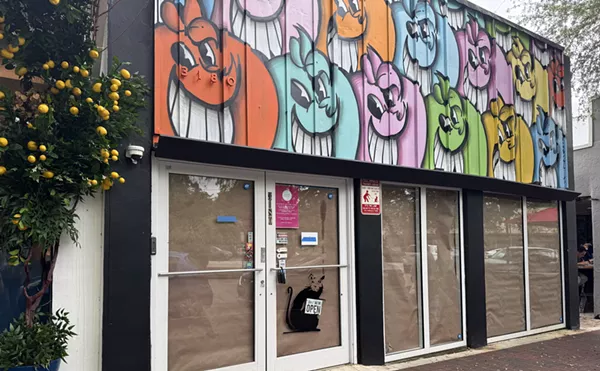It was the kind of case that breezes through the courts every day.
Then a friend of Antonio's contacted his mother, Virginia. A Miami lawyer could get her son out of prison early, he said.
At the time, Israel Perez Jr. was a defense attorney with almost twenty years of experience, including time clocked as a prosecutor in Fort Myers and Miami-Dade, where he served under Janet Reno. Before he met Antonio Monroy, the only blight on his record had been a 1993 public reprimand by the Florida Bar for improperly handling the funds of a client. Perez had an office in a black and tan tower called the Gables International Plaza in Coral Gables. He seemed like a reputable guy.
Virginia agreed to meet the lawyer, who soon showed up at her aging apartment building on Indian Creek Drive across from the Intracoastal Waterway in Miami Beach. According to the woman's description of that meeting, Perez laid out a plan. Perez would fly to Coleman and tell Antonio to expect two Drug Enforcement Administration agents to visit him after sentencing. Then agents would tell the court he deserved to be freed. It was a sure thing.
The cost to Antonio and his mother would be $100,000.
On March 26, 1999, Antonio was sentenced to nine years in prison. After the sentencing hearing, Antonio's friend contacted Virginia again to find out if she was still interested in buying Antonio's release.
Virginia said she would have to think about it. When she told her son about her conversations with Perez, he decided the whole thing was a scam and contacted the FBI. The bureau then persuaded Virginia and Antonio to meet with Perez — while wearing a wire.
During the next six months, over the course of some dozen meetings or telephone calls, all in Spanish, it became clear that Perez's plan — valid or not — was intricate. Transcripts of conversations he had, along with telephone calls that were recorded, show Perez planned the deceit to minute detail, where it might stall, how disagreements might occur, and generally how to avoid law enforcement scrutiny.
Regardless of all the video- and audio-taped meetings, so far there have been no arrests or indictments in the case. On September 14 the Florida Supreme Court disbarred Perez. A disturbing story is spelled out in a stack of FBI and DEA documents that became public record this summer, after they were introduced as evidence in the bar investigation into Perez. Though a handful of other Miami convicts surfaced, saying they had similar dealings with Perez, the two corrupt DEA agents were never identified. It now seems a probe into the affair has gone nowhere.
Federal authorities declined to comment about the case. So did Monroy. A call placed to Perez's old law office — which by court order is in the process of closing down — reached only an answering machine. A message New Times left was not returned. Calls to three other numbers once monitored by the FBI led to dead ends. Another message was left at Perez's home, with no response. In bar documents, he denied Antonio's claims in a series of letters to Florida Bar investigators.
If there's any truth to Perez's claims about working with rogue DEA agents, the case raises serious questions about the propriety of drug investigations and prosecutions in South Florida, and about why Perez was never charged with a crime. It could mean there is again a "For Sale" sign on badges in Miami.
It all began on a sweltering July day in 1999 when Perez knocked on the door of Virginia Monroy's sixth-floor apartment in Miami Beach. After several minutes of small talk, they turned to business. She expressed concern for her son and asked lots of questions. Perez patiently answered all of them, describing the legal process that allows for convicted defendants who help the government to leave jail early. He called the $100,000 a "fee" and repeatedly guaranteed it would bring Antonio home.
Referring to the corrupt DEA agents, Perez said to Virginia: "I bring a file like this one to them and tell them, 'This is the man; go do what you have to do.'" He then explained the DEA agents would want their money when Antonio had the recommendation for a sentence reduction in hand.
But, he warned, she could not back out. Otherwise the agents would say Antonio lied. Then he might get more jail time. "In other words," Perez said, "you'll be responsible for your actions."
This warning would be made repeatedly throughout the conversations to come — have the money, or else. Perez also warned Virginia that she and Antonio would have no one to turn to if they decided to rat him out. He said no judge would believe they'd been scammed by the DEA. "They are going to laugh right in that person's face," Perez said.
On the evening of July 18, Virginia Monroy and her daughter-in-law Claudia sat in their car in the parking lot of the La Carreta restaurant on North Kendall Drive. It was just after 6:30, and the two were waiting to meet Perez. Virginia was wired for sound and holding $1500 — money provided to her and photocopied by authorities — to pay for Perez's trip to see Antonio in Coleman.
At 7:00, Perez pulled into the parking lot. Virginia and Claudia walked over to his vehicle and piled in. During their conversation, Perez reminded Virginia again she would need to pay him $100,000 when the motion to reduce Antonio's sentence was delivered. According to an FBI report, during the conversation, "Perez told Virginia Monroy that if there is a problem with the payment, someone is going to end up dead."
He added that he would call her once he returned from Coleman. The meeting lasted for just less than twenty minutes.
Four days later, around 2:15 in the afternoon, Israel Perez walked into the federal prison in Coleman. He was led to a bugged interview room to await Antonio. Around 3:15, a prison guard escorted Monroy into the room, and investigators began recording.
During the conversation, Antonio said almost nothing while Perez talked at length about the plan and what could derail it. He began by noting his experience in law and then explained how the process for reducing a defendant's sentence in exchange for cooperation is supposed to work. There would be a "variation" on this one, he explained. A record of Monroy's assistance "will be fabricated" by Perez's DEA contacts.
In several months, Perez said, two DEA agents would arrive at the prison. Monroy should inspect badges to verify names, which Perez said he would provide. They would be there to leave a paper trail as evidence they had talked to Antonio. It didn't matter what they discussed: "You can talk about fucking, that you can't wait to fuck, that — whatever," Perez said with a laugh, according to the FBI transcript. "[You can say] that you can't wait to sniff, smoke ... [have] a joint, to take a prick up your ass," Perez added with another laugh.
In fact Perez said Antonio should be suspicious if the agents asked him for information — because they might be impostors. The lawyer boasted that his two DEA contacts were Americans working out of the Miami field office. One had 24 years on the job, the other 15 years. "They know what they are doing and they have done it many times," Perez told Antonio at one point.
Eventually the agents would approach the U.S. Attorney's Office for the Northern District of Florida and say Antonio had been helpful in making cases down in Miami. The prosecutor wouldn't know any better, because South Florida is another jurisdiction, Perez said.
If the U.S. Attorney's Office went along with the DEA agents' recommendation, prosecutors would ask a judge for a reduction in Antonio's sentence. Antonio wouldn't have to testify, speak with prosecutors, or address the judge. "The day they go and talk to the judge and the prosecutor about ... all the things you have done, you know, you may be surprised about all the things they are going to say," Perez said to Antonio. "You're just going to sit there, you know, and, and, you know — that's it."
Perez also warned Antonio that if their agreement was disclosed, he would deny it. And if Antonio didn't pay up, the lawyer said the DEA agents would tell prosecutors he had lied to them. There was a paragraph in Antonio's plea deal that allowed for a longer sentence if he deceived authorities.
"I'm just saying that if you have to eat shit, you'll know why you have to eat shit," Perez said. "So that you don't come to me, [and say], 'Damn, I didn't know.' No, you did know it very well because I am explaining it to you."
There is also a more severe threat hidden in the conversation, in the sometimes vague phrases people use when discussing things that aren't exactly legal. "I hope your mom doesn't come to me crying, because there is no room for explanations," Perez said. "It's not that I'm a bad person; I am a nice guy, but business is business."
Over the next three months, Virginia met with Perez at least six times — twice at her apartment, twice at a Dunkin' Donuts near the corner of Collins Avenue and 68th Street, once at the Los Marinos Cafeteria on 37th Avenue near Flagler, and once at the Mar y Tierra supermarket at Eighth Avenue and NW First Street. At each meeting, the two discussed the execution of Perez's plan. During this time, Virginia became increasingly frantic, saying Antonio was stressed about his jail sentence. And during this time, Perez reportedly became more difficult to reach.
Next week: The federal government's case unravels.












